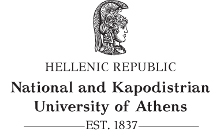Menu
- NEWS AND EVENTS
- THE DEPARTMENT
- UNDERGRADUATE STUDIES
- POSTGRADUATE STUDIES
- DOCTORAL STUDIES
- ACADEMIC STAFF
-
RESEARCH
- INSTITUTE OF ADMINISTRATIVE SCIENCES
- CENTER FOR STUDIES OF GREEK AND EUROPEAN PUBLIC LAW (HISTORY, PRINCIPLES, INSTITUTIONS, RIGHTS) [CESGEPL]
- INSTITUTE OF GREEK POLITICS
- INSTITUTE OF EUROPEAN INTEGRATION AND POLICY
- INSTITUTE FOR THE STUDY OF GREEK-GERMAN RELATIONS
- INSTITUTE FOR MIGRATION AND DIASPORA STUDIES (EMMEDIA)
- LAB OF POLITICAL COMMUNICATION AND INFORMATION MEDIA
- RESEARCH CENTRE FOR ECONOMIC POLICY, GOVERNANCE AND DEVELOPMENT
- LIBRARY
- ACADEMIC CALENDAR
- CONTACT
